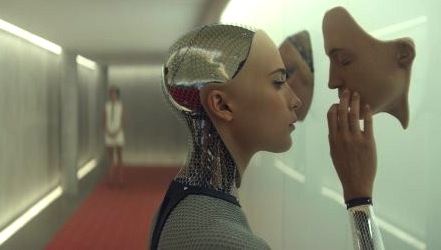 Yes, but who—or what—is the deus in this taut probe of artificial intelligence?
Yes, but who—or what—is the deus in this taut probe of artificial intelligence?
Directed by sci-fi screenwriter Alex Garland, Ex Machina slowly turns some of the major questions of futuristic metaphysics (e.g. Philip K. Dick) around in its spare, elegiac hour and 45 minutes. With complete precision the film moves like a beautiful Swiss watch, involving only a few moving parts. It is impossible to stop watching.
Irish actor Domhnall Gleeson is Caleb, a young programmer selected by billionaire über scientist (read Victor Frankenstein) Nathan Bateman (Oscar Isaac) to take part in a variation on the Türing test (is an artificial creation capable of exhibiting seamless consciousness). Helicoptered to Nathan’s remote compound (you can feel Mary Shelley haunting the wild and rocky periphery) Caleb meets both the creator, and his creation Ava (Alicia Vikander) a disturbingly perceptive composite of beauty and circuitry. Caleb has seven days in which to decide whether Ava is the real deal. Is she capable of self-awareness, emotion, humor, and deception? Without revealing crucial plot details, the short answer is hell yes! What happens, however, as we gradually gain increasing knowledge that things are not what they seem in this controlled Eden is both shocking, and predictable.
It is a tale that has been spun around campfires since the dawn of, well, at least the Internet. Might a skillfully designed digital entity equal, or surpass its organic creators? Nathan (played with high animality and searing intensity by Isaac) is convinced that the digital perfection of networked intelligence is not only on its way, but is practically a done deal. In the persuasively nuanced Ava, we have the best visual idea of what such a surpassing AI creature might be like.The film is simply told in seven “sessions” with Ava. Caleb meets with her. They talk through hermetically sealed glass chambers. They exchange questions, answers, responses, and flirtations. Suspicions begin to pop up about Nathan’s real agenda. Is he a malevolent Yaweh, creating the world in seven days, or set to undo it? Many such obvious, perhaps a bit over-wrought tropes emerge to embellish what amounts to a sleek, slick, almost plotless, and very idea-intensive bit of filmmaking.
The sensory contrasts, rather than plot, move Ex Machina into rich territory. Nathan is all testesterone, a man who drinks hard, revels in fine foods, climbs glaciers, lifts weights, in short who embodies physicality in the exact opposite handfuls as his creation Ava embodies cool, innocent, digital perfection. Caleb—the gifted programmer who has been employed at Nathan’s mega-search engine company—is the awkward cerebral counter-balance. A fourth entity in this claustrophobic resort-style laboratory is a glacial Asian servant (Sonoya Mizuno) who is also Nathan’s main squeeze. And who does not speak.
Cinematically, the film forces you to confront extremes of every sort. Especially of physical/digital reality. If you take nothing else away from Ex Machina, you will for sure be making travel plans for Norway whose astonishingly primal, wet, green, rocky, waterfall misted landscape forms the mythic antithesis of Nathan’s cyber design. The breathtaking physical setting of our inventor’s compound provides almost incomprehensible contrast with the complete artificiality, the clean perfection, of the experimental chambers. And this too is part of the director’s point, along with lots of shots in which we see our “everyman” Caleb reflected—doppelgangered—in the lucite walls and hallways of the setting. Caleb and his unreal double.In the end the film is a sleek thought experiment, at first obvious but gradually unfolding into a few moves you might not expect. I didn’t.
But the film persisted for me most deeply on a profoundly despairing level. In one conversational exchange with Caleb, bombastic genius Nathan matter-of-factly points out that AI is inevitable. They—the future artificial inheritors of our cultural existence—will one day look back at us, Nathan contends,—as if we humans were simply a bunch of glorified apes. In the Jurassic Park of the future Nathan has invented, our biological reality will be on display as relics of a brief, pre-digital experiment. It will all be post human.
I realized that everything in our world right now—the internet, digital simulation, cell phones—dooms us to his prophecy. As Hegel once said, “the feet of those who will carry you out are already at the door.” Some will find this prospect exciting. I find it heartbreaking.


Nice review, Christina. I liked how this movie worked as both thriller and metaphor!
This movie was riveting. It had a theatrical quality, too, with just 3 (or 4) primary actors and primarily using the setting of the house as the “set.” It’s a rare move that I would actually go see for a second time. Thanks for your thoughtful review.